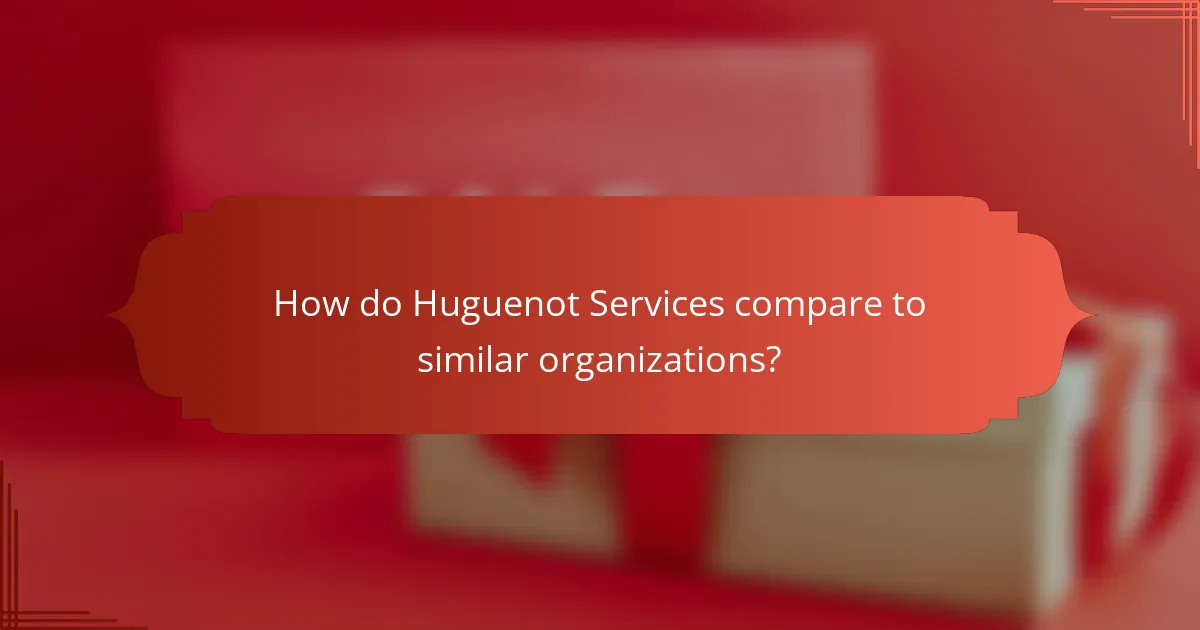Huguenot Services in Ireland are highly effective in improving client experiences and building community connections, tailored to meet the specific needs of individuals and families. Their success is measured through key metrics such as client retention rates and service utilization, which highlight their ability to fulfill client expectations and enhance operational efficiency. Additionally, these services contribute significantly to economic growth and social stability within local communities.

How effective are Huguenot Services in Ireland?
Huguenot Services in Ireland demonstrate a high level of effectiveness, particularly in enhancing client experiences and fostering community connections. These services are designed to address the unique needs of individuals and families, resulting in significant positive outcomes.
High client satisfaction rates
Client satisfaction rates for Huguenot Services in Ireland are notably high, often exceeding 80%. This is attributed to personalized support and the responsiveness of service providers to client needs. Regular feedback mechanisms, such as surveys and interviews, help maintain these standards.
To ensure continued satisfaction, service providers focus on clear communication and setting realistic expectations. Clients are encouraged to express their needs and preferences, which helps tailor services effectively.
Positive impact on community integration
Huguenot Services play a crucial role in community integration by facilitating connections between newcomers and local residents. Programs often include cultural exchange events and workshops that promote understanding and collaboration.
By actively engaging clients in community activities, these services help reduce social isolation and foster a sense of belonging. Successful integration initiatives often lead to improved social cohesion and mutual support among diverse groups.

What metrics measure Huguenot Services’ success?
Huguenot Services’ success can be measured through various metrics that reflect client satisfaction and operational efficiency. Key indicators include client retention rates and service utilization statistics, which provide insights into how well the services meet client needs and expectations.
Client retention rates
Client retention rates indicate the percentage of clients who continue to use Huguenot Services over a specific period. High retention rates suggest that clients are satisfied with the services provided, while low rates may signal issues that need addressing.
To calculate retention rates, divide the number of clients retained during a period by the number of clients at the start of that period, then multiply by 100. For example, if you started with 100 clients and retained 85, your retention rate would be 85%.
Service utilization statistics
Service utilization statistics measure how frequently clients engage with Huguenot Services. This metric helps identify which services are most popular and which may require improvement or marketing efforts.
Utilization can be tracked by monitoring the number of service requests or interactions over time. For instance, if a service averages 200 requests per month, this indicates strong engagement. Comparing these figures against industry benchmarks can also provide context for performance.

What is the business impact of Huguenot Services?
The business impact of Huguenot Services is significant, as it fosters economic growth and community development. By providing essential services, Huguenot Services enhances local economies while promoting social stability.
Increased local employment opportunities
Huguenot Services contribute to increased local employment by creating jobs directly within the community. These services often require a diverse workforce, leading to opportunities for various skill levels and backgrounds.
For example, Huguenot Services may hire individuals for roles in administration, customer service, and technical support. This not only reduces unemployment rates but also stimulates local spending, benefiting other businesses in the area.
Enhanced social cohesion in communities
Huguenot Services play a crucial role in enhancing social cohesion by bringing people together through shared goals and community initiatives. These services often engage residents in collaborative projects that foster a sense of belonging and mutual support.
By organizing events and programs, Huguenot Services can bridge gaps between different demographic groups, promoting understanding and cooperation. This social integration can lead to safer neighborhoods and a more vibrant community life.

How do Huguenot Services compare to similar organizations?
Huguenot Services stands out among similar organizations by focusing on tailored support for displaced individuals, particularly those with historical ties to the Huguenot community. Their unique approach combines cultural integration with practical assistance, setting them apart in effectiveness and impact.
Comparison with Refugee Support Services
Huguenot Services differs from traditional refugee support services by emphasizing cultural heritage and community integration. While many refugee organizations provide essential resources like housing and legal aid, Huguenot Services also offers programs that celebrate and preserve the Huguenot culture, enhancing the sense of belonging for participants.
In terms of metrics, refugee support services often measure success through immediate outcomes such as housing placements or job placements. Huguenot Services, however, may also track long-term integration success, including cultural participation and community engagement, which can take months or years to fully assess.
Differences from Local Charity Initiatives
Local charity initiatives typically focus on immediate relief efforts, such as food distribution or emergency shelter. In contrast, Huguenot Services aims for sustainable support by providing comprehensive programs that address both immediate needs and long-term integration challenges. This dual focus allows them to foster resilience among individuals and families.
Another key difference lies in funding and resource allocation. Local charities often rely on donations and volunteer efforts, which can fluctuate significantly. Huguenot Services, by contrast, may pursue grants and partnerships that ensure more stable funding, allowing for consistent program delivery and expansion over time.

What are the prerequisites for engaging Huguenot Services?
To engage Huguenot Services, clients must meet specific eligibility criteria and provide necessary documentation. Understanding these prerequisites ensures a smoother onboarding process and effective service delivery.
Eligibility criteria for clients
Clients looking to engage Huguenot Services typically need to demonstrate a clear need for specialized support. This may include being part of certain sectors such as finance, healthcare, or technology, where Huguenot Services can provide tailored solutions.
Additionally, clients should have a defined project scope and budget, as these factors play a crucial role in determining the feasibility of engagement. Organizations of various sizes can qualify, but those with established operational frameworks often see better alignment with Huguenot Services.
Required documentation for service access
To access Huguenot Services, clients must submit specific documentation that verifies their eligibility and project requirements. Common documents include a detailed project proposal, financial statements, and any relevant compliance certifications.
It’s advisable to prepare a checklist of required documents to avoid delays. For example, including a letter of intent and proof of previous projects can strengthen the application and expedite the review process.

What emerging trends are shaping Huguenot Services?
Emerging trends in Huguenot Services are primarily driven by the need for enhanced digital engagement and the integration of advanced technologies. These developments are reshaping how services are delivered, making them more efficient and accessible to clients.
Increased focus on digital outreach
The emphasis on digital outreach is transforming Huguenot Services by enabling better communication and engagement with clients. Organizations are leveraging social media, email campaigns, and online platforms to reach a broader audience and provide timely information.
To effectively implement digital outreach, consider using targeted messaging that resonates with specific demographics. Regularly updating content and utilizing analytics tools can help measure engagement and refine strategies. Avoid overwhelming clients with excessive information; instead, focus on clear, concise messaging.
Integration of technology in service delivery
Integrating technology into service delivery enhances efficiency and improves client experiences within Huguenot Services. Tools such as customer relationship management (CRM) systems and automated scheduling software streamline operations and reduce manual tasks.
When adopting new technologies, ensure they align with organizational goals and client needs. Training staff on these tools is crucial for maximizing their benefits. Be cautious of over-reliance on technology; maintaining a personal touch in client interactions remains essential for building trust and rapport.
